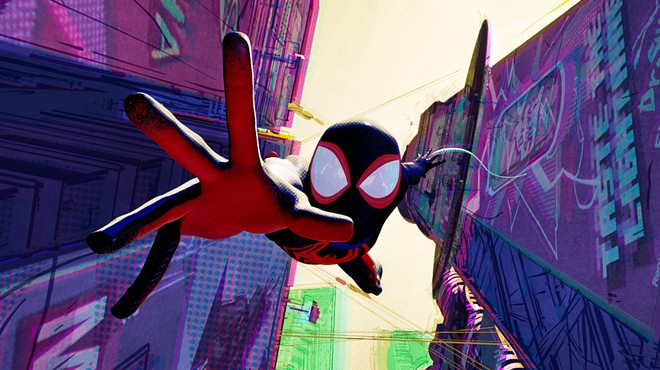
Into the Spider-Verse was the radioactive spider that bit me and changed my DNA forever.
What rocked my world was simple: Spider-Man is Afro-Latino. Miles Morales (Shameik Moore) is a dark-skinned, curly-haired, Spanglish-speaking, plátanos-eating kid dodging besos from his overprotective Latina mom just like me. For the first time, I could picture myself under my favorite superhero mask.
For five years, I waited impatiently for my Spider-Man to return, and on June 2, he did so with a bang. Spider-Man: Across the Spider-Verse exceeds expectations with breathtaking animation, lovable characters, insidious villains and more.
One of the sequel’s biggest triumphs is its doubling down on the importance of Miles’ racial and cultural identity to his role as Spider-Man.
Miles’ Afro-Latino identity is more than just an accessory. It’s a source of strength and part of what makes him an incredible Spider-Man. The result is an empowering watch for anyone, but it hits hardest for Black, Brown and Latine people, who now feel reflected on the big screen.
The absence of subtitles for the Spanish dialogue throughout the film is a deliberate choice that speaks volumes. Phil Lord, the producer behind this decision, explains, “I grew up in a bilingual household in the bilingual city of Miami where you hear Spanish all over the place, and it’s not particularly remarkable. It was important for us to hear Spanish and not necessarily have it subtitled. It’s just part of the fabric of Miles’ community and family life.”
White, English-speaking audiences expect subtitles because they’ve always been the target audience. But this default perpetuates harmful structures of white superiority in the film industry and marginalizes non-white cultures as “outsiders.” By ditching the subtitles, Across the Spider-Verse repudiates these ideas.
Spanish, as part of Miles’ cultural identity, is seamlessly embedded into the film. It just belongs, and it’s a powerful message for Spanish speakers: You belong, and this is for you.
Across the Spider-Verse portrays Afro-Latino heritage most impactfully through Miles’ relationship with his mother, Rio Morales (Lauren Vélez).
Every Latine family member in the audience can relate to their interactions — Rio snapping at Miles for getting a “B” in Spanish class, freaking out at the idea of him leaving home for New Jersey, wanting him to date a Spanish speaker or fearing that no one will care for him like she does — fun moments that demonstrate strong familial values and pride engrained in our roots and history.
Miles’ rich family history, strong familial ties, and pride unique to his Afro-Latino heritage are all things that the Peter Parkers of the Multiverse never had and become a major source of strength as he takes charge of his destiny.
The most potent example is the advice that Rio gives Miles before he embarks on his most dangerous mission yet: “Wherever you go from here, you have to promise to take care of that little boy for me. Make sure he never forgets where he came from. And never doubts that he’s loved. And never lets anyone tell him that he doesn’t belong there.”
Rio’s words undeniably carry a different weight for those who have been excluded and oppressed on account of their identity.
As a Black, Dominican American who has spent most of my life in predominantly white spaces, I know the feeling of having others define my identity and tell me what I am and am not capable of. I’ve navigated the thin line between identities, often feeling like I don’t truly belong to either. Rio’s words are like a North Star, a reminder to, no matter what, remember who you are and have confidence. You are worthy.
Rio’s heartfelt message allows Miles to be fearless come the main conflict of the film, when he’s told that he was never supposed to be Spider-Man and that he doesn’t belong. In a badass sequence of defiance and willpower, Miles affirms his identity as Spider-Man and defeats them all, attributing his strength to his family. He tells his mother, “I kept thinking about what you said. … I know how strong I am now. I’m strong because of you and dad, and us.”
I was electrified in my seat. Watching Miles win felt like watching us win.
Stan Lee famously said that anyone can wear the mask, but Across the Spider-Verse gives us a Spider-Man that is distinctly and authentically Afro-Latino, and that means something. The next generation of Spidey fans will grow up with a Black, Puerto Rican Spider-Man who’s strong because of where he’s from, not in spite of it. How beautiful is that?
The Riverfront Times welcomes well-reasoned essays on subjects of local interest. Contact [email protected] if you've got something to say.
Subscribe to Riverfront Times newsletters. Follow us: Apple News | Google News | NewsBreak | Reddit | Instagram | Facebook | Twitter | Or sign up for our RSS Feed






